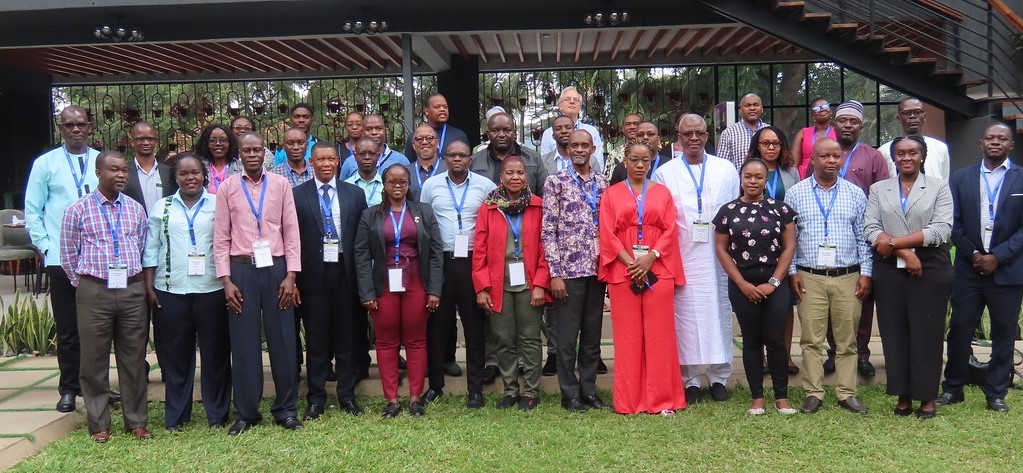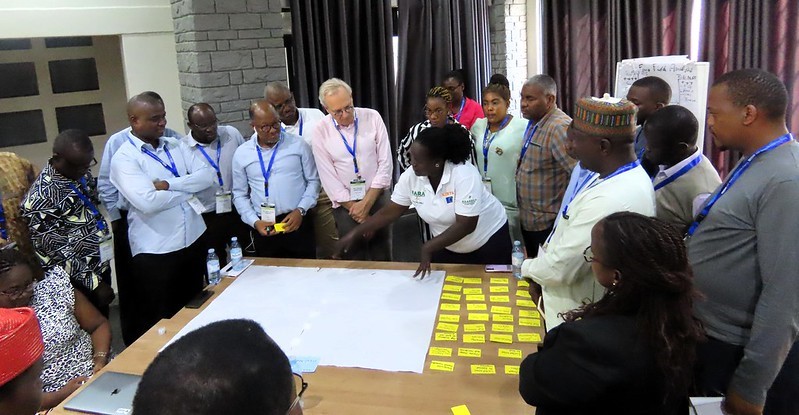
Authors: Ibenu Sharon (AFAAS), Bridget Kakuwa (CCARDESA), Benjamin Abugri (FARA)
14th August, Kampala – Uganda – With the overarching goal of fostering sustainable agricultural research transformation and rural development across Africa, the importance of strategic alliances and effective resource mobilization cannot be overstated. To this end, the CAADPXP4 Consortium comprising the Forum for Agricultural Research in Africa (FARA), the African Forum for Agricultural Advisory Services (AFAAS), the Association for Strengthening Agricultural Research in Eastern and Central Africa ( ASARECA), the Centre for Coordination of Agricultural Research and Development for Southern Africa (CCARDESA) and the West and Central African Council for Agricultural Research and Development (CORAF) organized a Comprehensive resource mobilization training in collaboration with the Food, Agriculture and Natural Resources Policy Analysis Network (FANRPAN) and the Regional Universities Forum for Capacity Building in Agriculture (RUFORUM) conducted an Intensive Resource Mobilization Training to equip stakeholders with the necessary skills and knowledge.
This training, conducted at the Fairway Hotel Kampala from 9th to 14th August 2023, aimed to address gaps in resource mobilization, crafting robust and sustainable fundraising strategies. Besides theoretical instruction, the training emphasized hands-on practice, targeting a diverse audience from Research and Extension institutions. The initiative focuses on fundamental principles, practical techniques, ethical considerations, and strategic evolution, hoping to revolutionize the way resources are mobilized.

Dr. Aggrey Agumya, the Executive Director of FARA, highlighted the timeliness of this initiative, emphasizing the growing financial challenges faced by AR4D research organizations. He spotlighted the shrinking resources and increasing dependencies, urging the need for more innovative funding solutions, especially given the pandemic’s financial impact and changing donor priorities. Dr. Agumya further intimated that Funders are showing a preference for interventions that yield tangible results in a short time, which has further put the supra-national AR4D organizations at a disadvantage because their results/outcomes are not readily tangible, and they are medium to long-term. “Under these circumstances, it is essential that these organizations and the national partners they support are compelled to find innovative ways of mobilizing resources and build the required capacities” emphasized Dr Agumya.
Echoing this sentiment, Mr. Max Olupot the Director of Programmes from AFAAS recognized Dr. Agumya’s leadership ascent and underscored the urgency of resource mobilization for the consortium’s continuity. He further noted that this period was critical for the CAADPXP4 Consortium as the CAADP-XP4 program is coming to an end and hence need to solicit more funds so that there is continuity and sustainability.
Dr. Baisti Podisi, the CAADP-XP4 Coordinator from CCARDESA indicated that the meeting was a progression of CCARDESA’s existing initiatives. “This meeting will help us build more partnerships and Agroecology is a niche topic that all of us in the room could ride and benefit from. It is critical as SROs to catalyze our institutions to support our countries’ access to funding. We need to be more innovative in engaging the private partnership.” Re-echoed, Dr Podisi.
Ms. Julian Barungi speaking on behalf of the ASARECA Executive Director emphasized their unwavering commitment to the consortium’s partnerships.
The Resource Mobilization training unfolded in two distinct phases with the virtual Training, spanning five days, this phase deep-dived into resource mobilization, encompassing an array of topics, from fundraising strategies and the moral aspects of resource mobilization to monitoring, evaluation, and best practices.

Whereas the ppractical application and second segment focused on drafting effective proposals. It was tailored to address currently active calls for proposals, leveraging themes from the Horizon Europe Working Programme and the EC-INTPA calls.
This endeavor by the CAADP-XP4 Consortium epitomizes hope for Africa’s sustainable agricultural evolution. It does not only arms stakeholders with indispensable skills but also signifies the transformative power of unity and strategic collaborations in reshaping Africa’s agricultural horizon.
